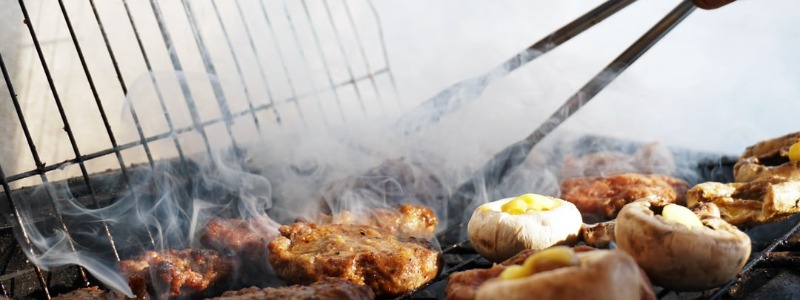Tailgating season is about to commence and as gridiron Sundays take over, the grill will be fired up to cook fan favorite dishes. Jessica Engelbrecht, RD, clinical oncology dietitian at Cancer Treatment Centers of America® (CTCA) in Tulsa, Oklahoma, advises that grilling isn’t always the healthiest method of cooking. Research suggests that grilling meats at high temperatures over an open flame creates carcinogenic compounds called heterocyclic amines (HCAs), which can damage the DNA in genes and potentially contribute to the development of cancer. High intake of meat cooked to a high temperature has been associated with increased risk of colorectal, pancreatic and prostate cancers.
That doesn’t mean you need to avoid the grill, though, Jessica Engelbrecht, RD suggests using grilling methods that safely cook meats:
“How you cook meat can be the best method of preventing carcinogenic compound formation,” says Engelbrecht. “Using simple methods that help prevent meat juices and fat from dripping down onto the flames or heat can help you avoid the charring that leads to the formation of HCAs.”
- Opt for a gas grill over charcoal. When grilling with charcoal, not only can carcinogens develop in the meat from cooking at very high temperatures, but also fat from the meat can drip on the coals, causing flares and smoke, which can spread carcinogens onto the food. With a gas grill, you have better control of the heat, reducing the chance of charring. Plus, you won’t complain when your grill is ready in a fraction of the time it takes charcoal to heat properly.
- Properly thaw meat ahead of time. This will ensure that excess juice will not splash on the coals causing flares.
- Flip often. If you’re grilling burgers, avoid flattening the patties while cooking them; instead, turn them more frequently to ensure even cooking.
- Try cooking all meats on top of foil, in a foil package, or on a raised cooking surface away from the main source of heat. This will reduce the chance of charring from a flare.
- Grill at the lowest temperature possible to avoid charring. But, if charring occurs, you can choose to trim off those parts.
- Marinate meats. Using certain marinades and spices when cooking food on the grill can decrease HCA formation by up to 96 percent.
- Pre-cook inside to minimize time on the grill.
Healthier choices for grilled meals
“Your best options for a healthy grilled meal start with lean proteins, vegetables and fruits,” says Engelbrecht. “From there, add flavor with healthy marinades.”
- Select lean proteins like chicken, fish and tofu and be sure to include vegetables and even fruit in your grilled meals. Try this recipe for grilled chicken with fresh herbs or this recipe for grilled salmon with orange fennel salsa for dinner, and consider grilled pineapple slices or grilled peach halves for a delicious dessert.
- Spice it up! Adding spices to your food is a great way to add flavor. Three spices to explore in your grilling adventures include,
- Try mixing turmeric with a mustard marinade or to a relish to top on your meat. With its subtle nutty flavor, it’s delicious on all poultry. Ginger. Pairing particularly well with red meat, ginger can help with digestion. Add it to a marinade to give a big boost in flavor.
- This warming spice is usually used with baked goods, but it’s also surprisingly delicious with animal meats, so add a dash to marinades for a pleasantly warm palate?.
- Add fresh herbs. Oregano, rosemary, mint, dill, cilantro, sweet basil, thyme, tarragon and lemon balm give zesty appeal to marinades. Plant your own herbs in a pot or a sunny spot in your garden and enjoy their flavor affordably all season long.
As you enjoy grilling out this summer remember to take advantage of the greater variety of fruits and veggies available. To balance your diet accompany your grilled entrée with seasonal salads and sides. Try our new Spinach and Blueberry Salad or Fresh Beet Salad for your next backyard barbecue.

